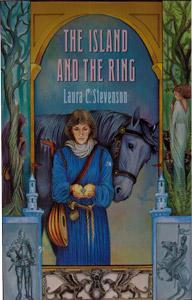The Island and the Ring
"I could take you to your mother's people," said Eliar. "You would be safe with them." Tania had little choice. Yesterday she had been a princess whose father had united the lords of Elyssonne against the tyrant Ascanet. Today, her father and his allied lay dead in his betrayed castle. She was a fugitive, and Eliar was her only companion. She would have to go with him. As they crossed Elyssonne, however, Tania discovered that some mysterious force attracted Ascanet to her wherever she went. And when she reached her mother's country at last, she found that she had the power to free Elyssonne from Ascanet - or to sink the island into the sea.
After he formed the earth by harmonizing the discord of chaos, the great god Theon ``took the purest elements in everything that grew and pressed them together between his palms.'' Stevenson's second YA novel is set on the island of Elyssonne--home to the last remnant of Theon's ancient creation. One by one, Elyssonne's kingdoms fall to the villainous Ascanet, who dominates by overt violence and insidious psychology. When Ascanet tricks Tania's father into militant ways that devastate her kingdom, she flees--but not alone. Paired with the enigmatic Eliar, she discovers the protective valley of Descaria as ancient myth and prophecy divulge their secrets and unfold Tania's role in winning back the Golden Age of Elyssonne. Stevenson masterfully braids these separate melodies into a poignant fugue the harmony of which is distorted, and almost ruined, by Ascanet's dissonance. The story is classic fantasy and romance told in a refined tone that will appeal to subtle tastes. The lean but hyper-visual narrative feeds the reader's imagination while the dialogue effortlessly imparts deep philosophy. Ages 10-14. (Oct.)
--Publisher's Weekly
Gr 7-12-- Robin McKinley, Anne McCaffrey, Ursula LeGuin, among others, have offered interesting variations on the theme of a female hero. Now a new voice, informed by Elizabethan scholarship, links the heroic ideals of courage and self-sacrifice with the values of the pastoral romance: innocence, nonviolence, and love. Tania, the sheltered daughter of a king, survives her father's abortive rebellion against Ascanet, the evil conqueror of the island Elyssone. Grudgingly, she accepts the protection of the only other survivor, fellow musician Eliar, a supremely talented, hideously scarred, sardonic man who leads her to safety among her mother's people in Dacaria and along the way provides an education of the heart. But Tania cannot take refuge in that idyllic, secret valley, for as she escaped her father's burning castle, she accidentally acquired a sapphire ring, the source of Ascanet's power. She must use it to destroy him, even though this act may cause the death of Eliar, whom she has come to love. Tania's only fault, her fear of intimacy, sometimes serves more to maintain suspense than round her character. There are also some implausible turns of plot, a few too many actors, and a magical power--telepathic communication--that is only vaguely limited. Yet these are minor flaws in an ambitious and largely successful attempt to restate the heroic quest in women's terms. Familiar themes of myth and fairy tale harmonize with a satisfying romance to create a story devotees of McKinley will enjoy. A convincing setting and a rousing crescendo add to the pleasure.
--Margaret A. Chang, North Adams State College, MA
